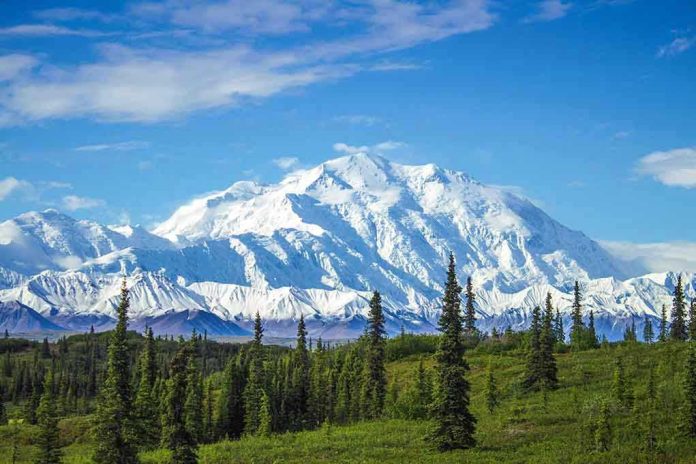
Millions of acres of American Arctic wilderness are no longer locked away by leftist policies, as President Trump fulfills his promise to unleash U.S. energy and restore commonsense governance.
Story Snapshot
- Trump administration repeals Biden-era Arctic drilling bans, reopening millions of acres for oil and gas development.
- Restoration of leasing rights in Alaska positions America for energy independence and job growth.
- Environmental groups and some Indigenous voices argue against the move, while local Alaskan leaders praise economic self-determination.
- Debate intensifies over balancing energy, conservation, and constitutional rights in federal land management.
Trump Reverses Biden’s Blockade: Millions of Arctic Acres Unlocked
On November 13, 2025, the Trump administration finalized its repeal of the restrictive 2024 Management and Protection rule for the National Petroleum Reserve-Alaska (NPR-A), restoring access to millions of acres previously blocked by the Biden administration. This sweeping action reopens Alaska’s Arctic National Wildlife Refuge (ANWR) and NPR-A to oil and gas leasing, reversing the moratorium imposed in 2021 and aligning with Trump’s pledge to expand domestic energy production. The decision delivers a direct response to years of leftist overreach that sidelined American workers and jeopardized energy security.
The rollback comes after years of heated conflict between federal regulators, local Alaskan leaders, environmental activists, and Indigenous communities. The Trump administration cites economic development, energy independence, and constitutional principles as its core motivations, while critics warn of potential environmental and cultural consequences. In recent statements, Secretary of the Interior Doug Burgum argued that previous “zoo or reserve” policies in Washington deprived Alaskans of self-determination and prosperity. The administration’s new rules aim to restore a balance between responsible resource development and conservation, rejecting what many see as radical, anti-growth agendas pushed by the prior administration.
Economic Revival and Energy Security: Alaska Leads the Way
Alaska’s resurgence as a top oil-producing state signals a major victory for American industry. By July 2025, Alaska ranked sixth in U.S. crude oil output, fueled by increased Arctic activity and renewed investor interest. Trump’s energy policies have consistently prioritized job creation, lower consumer prices, and a reduction in foreign dependence. The repeal of NPR-A protections and renewed leasing in ANWR open the door for thousands of new jobs across extraction, logistics, and support sectors. Local leaders and pro-development Indigenous voices emphasize the importance of economic opportunity and cultural autonomy, while financial institutions continue to scrutinize the risk and scale of new projects.
Despite the broad opportunity, the January 2025 ANWR lease sale attracted zero bidders, highlighting ongoing uncertainty in the market. Experts point to high development costs, limited infrastructure, and continued environmental scrutiny as factors shaping investment decisions. Nonetheless, energy analysts forecast long-term gains, especially as regulatory clarity and pro-business policies take hold. The Trump administration’s rapid permitting pace outstrips the previous administration by 44%, confirming that the era of bureaucratic stagnation is over and the American energy sector is once again primed for growth and innovation.
Legal Battles and Advocacy: The Fight Over America’s Arctic Future
Environmental groups and some Indigenous communities have vowed to challenge the Trump administration’s Arctic drilling restoration in court. Organizations like Earthjustice and Sierra Club claim that expanded drilling threatens wildlife, cultural heritage, and the broader fight against climate change. Legal experts anticipate a wave of lawsuits targeting the rollback of NPR-A protections and new offshore drilling rules, echoing past efforts to block Trump’s energy agenda. Pro-conservation advocates argue that the move could have significant long-term impacts, especially as the Arctic faces rapid ecological change.
On the other side, many Alaskans and pro-development Indigenous leaders see the new policy as a return to constitutional principles and local control. The Voice of the Arctic Iñupiat (VOICE) welcomed the shift, emphasizing economic self-determination and the right to manage resources for the benefit of local communities. The ongoing debate underscores the clash between federal overreach and states’ rights, a core concern for conservatives. As the Trump administration advances its Arctic vision, Americans watch closely to see whether legal and political battles will shape the future of energy, jobs, and constitutional liberties in the nation’s last frontier.
https://twitter.com/realTuckFrumper/status/1989098922665513168
While the restoration of Arctic drilling marks a decisive victory against the left’s radical environmental agenda, uncertainty remains over how quickly new projects will materialize. The Trump administration has signaled its intent to accelerate permits and cut red tape, but investment decisions and legal challenges will shape the pace and scale of development. Conservatives celebrate the rollback as a triumph for American workers, energy independence, and commonsense government, while critics warn of environmental and cultural costs. As the dust settles, the battle over Alaska’s resources stands as a defining test of federal authority, constitutional rights, and the values that shape America’s future.
Sources:
MSCI: Trump Administration Proposes Changes to Arctic Drilling Rules
Eos: 1.5 Million Acres of Alaskan Wildlife Refuge to Open for Drilling
White House: Unleashing Alaska’s Extraordinary Resource Potential











